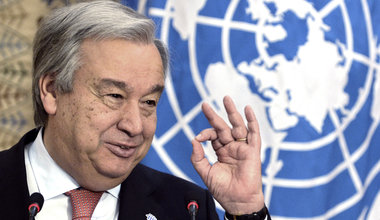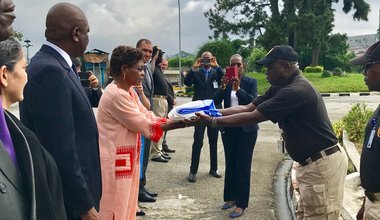Daily Brief on Cote d’Ivoire for Wednesday, 10 September 2008
- Elections preparations have reached a point of no return, says SRSG
- Situation tense in Vavoua as FAFN "dissidents" are arrested
- UNOCI's MORBATT gives free medical treatment to hundreds in Issia
Electoral process
The Special Representative of the UN Secretary-General for Côte d'Ivoire, Y.J. Choi, today told staff from the Mission's Electoral Assistance Division (EAD) that preparations for presidential and legislative elections in Cote d'Ivoire had reached a point of no return. Mr. Choi said that the identification process will be launched on 15 September 2008 and there was every indication that it would go well, giving millions of Ivorians identity cards for the first time. He said that EAD staff should not be concerned with numerous media reports that the elections will be postponed because all the parties concerned, including the international community, are committed to the holding of elections. The identification process will be launched in Yamoussoukro, Gagnoa, Ferkéssédougou, Man, Bouna, Grand Bassam and Dabou.
Security
The situation in Vavoua was tense today as soldiers from the Armed forces of Forces Nouvelles (FAFN) went from house to house arresting their counterparts reportedly loyal to former Zone Commander Zacharia Koné. According to UNPOL, ten soldiers who were said to be close to the former commander are now in custody at the local Gendarmerie Brigade. During a meeting with his soldiers, the new Zone Commander, Issiaka Ouattara, yesterday asked all "dissident" soldiers to lay down their weapons and return their uniforms to the FAFN or face "serious consequences."
The UNOCI weekly coordination meeting held in Man raised concern on the issue of FAFN soldiers demanding money from UNOCI military and civilian staff as well as staff of UN agencies operating in the region. The meeting also noted with concern, the alleged encroachment upon parcels of land owned by villagers of Zantongouin and Zorolé by some Burkinabé migrants, as this could be a possible cause of tension in the future.
Arms embargo inspection
UNOCI peacekeepers conducted arms embargo inspections at the FAFN's 51st battalion in Camp Genie in Séguéla (centre-west), at its 11th battalion in Assoum, near Bouna (north east) and at its Unit in Sucafi, Ferkéssedougou (north) as well as at the National Armed Forces of Côte d'Ivoire (FANCI) Gendarmerie Brigades in Zagné, near Guiglo (west) and Daoukro (east).
Humanitarian
Hundreds of people received free medical treatment and medicines from the medical unit of the Moroccan battalion today in Issia (centre west) as part of a two-day event organized by UNOCI as a prelude to the redeployment of peacekeepers in the town. Qualifying matches for a football tournament were also organized between UNOCI and local teams. The day concluded with the showing of a film on 60 years of UN peacekeeping. An inauguration ceremony for two Quick Impact Projects financed by the Mission to rehabilitate a primary school and repair roads will be the highlight of tomorrow's events in the town which was previously hostile to the presence of the Mission in Côte d'Ivoire.
Human Rights,
The Regional Human Rights Office in Bouaké is following the case of a man who was allegedly physically assaulted and tortured on 31 August 2008 by five men, including two FAFN soldiers, who accused him of stealing a sheep. The FAFN soldiers, reportedly armed with Kalashnikovs, forcibly entered the victim's house and beat him with truncheons, military belts and the butts of their guns. They also allegedly inflicted burns on him with matches, and then took him to an abandoned house where they threatened him with death. The Office facilitated his treatment at UNOCI's level 2 hospital for wounds on his back, bottom, chest and head.
The Human Rights Regional Office in San Pedro participated in a roundtable discussion on the issue of land conflicts and illicit land transactions. During the discussions, traditional Chiefs representing several ethnic groups in Sassandra Prefecture including the Kroumen, Wané, and Neo, said that the current situation was characterized by increasing disputes among local communities over the exploitation and the ownership of limited land resources in the area. They said that the situation was exacerbated by the infringement of parts of the protected forest by settler communities.
 ONU
ONU Nations Unies Maintien de la paix
Nations Unies Maintien de la paix



